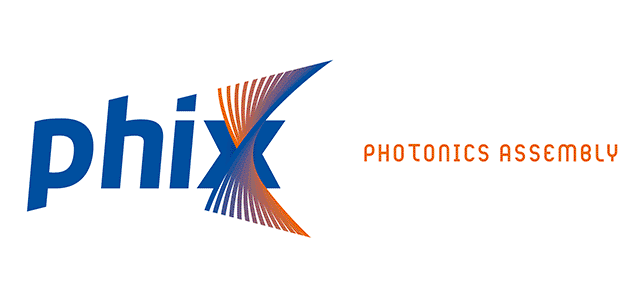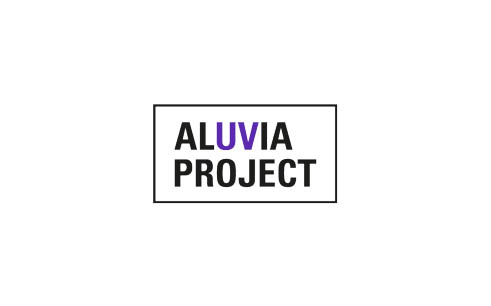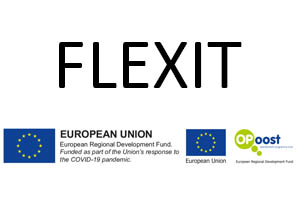
PARTNERSHIPS
Research projects
Our national and European research project collaborations support our roadmap and develop the base technologies that we can introduce to the market, enabling new applications for photonics assembly.
COMPAS aims to develop a compact, low-cost, and highly sensitive photonic integrated circuit (PIC) sensing platform for air and water quality monitoring. It does so by integrating light sources, detectors, and electronic ICs for on-chip signal processing. By leveraging wafer-level integration and a chiplet approach, COMPAS advances the co-integration of photonics, optoelectronics and microfluidics, paving the way for widespread photonic sensing applications. One of the contributions of PHIX deals with the flip chip bonding of photonic crystal surface-emitting lasers (PCSELs).
BlueArray is an EU Pathfinder project that explores breakthrough technologies for next generation underwater optical wireless communication (UOWC) systems. The project’s radically new approach enables efficient and high-speed optical beam steering, accomplished using advanced blue VCSELs, blue optical phased arrays (OPAs), a large-scale array of DA converters, and coherent receiver technologies. PHIX will contribute its expertise in precision integration of complex photonic systems, enabling cost-effective, robust, and scalable UOWC systems.
The objective of the MATEL project is to deliver a high quality photonic integration platform with graphene and high-quality piezoelectric ceramic (PZT) empowered silicon nitride. The platform is to be used in advanced optoelectronic applications in AR displays and biosensing of COVID-19 antibodies. This pushes PHIX to develop new packaging processes and introduces our services to new markets.
The goal of ALUVia is to establish the first European aluminum oxide on silicon dioxide (Al2O3-on-SiO2) integrated photonics platform for operation in the ultraviolet (UV) wavelength region. The power of this platform will be validated with two test applications, an integrated sensor for UV (resonant) Raman spectroscopy and an integrated multiple-ion trap for the parallelization of on-chip quantum qubit generation. PHIX will provide the packaging for these device prototypes.
TERA6G is a Horizon Europe project funded by the European Union whose objective is to develop a new generation of state-of-the-art THz transceivers. Building on the results of the TERAWAY project, TERA6G employs massive MIMO for beyond-5G networks, unlocking the Fiber-over-the-Air concept. PHIX will provide assembly and packaging of the transmitter and receiver modules, including packaging of 4×4 and 8×8 antenna arrays able to withstand high humidity environments with high temperature fluctuations.
The goal of the PHOREVER project is to develop the world’s first photonic integrated multi-sensing platform that will enable reliable detection of extracellular vehicles in blood (80nm in size) for fast and precise diagnosis of pancreatic cancer and stroke. The role of PHIX is to lead the assembly and packaging of modules where components like lasers, GaAs photodiodes, photo-multiplier tubes and microlenses are integrated onto a SiN platform.
The POLYNICES project aims to achieve polymer based electro-optic PCB motherboard integration with silicon nitride chiplets, indium phosphide components, and electronic ICs. With partners including Fraunhofer HHI, LioniX International, and Toptica, the project sets out to enable affordable photonic modules for terahertz sensing and quantum computing applications.
The PATTERN project is developing the next generation of ultra‐high‐speed microwave photonic integrated circuits using advanced hybrid integration. In partnership with Thales, Imec, Fraunhofer HHI, UCL, Microwave Photonics, and others, PHIX is developing new packaging solutions for these ultra high frequency signals. The hybrid integration includes indium phosphide (InP) with lithium niobate-on-insulator (LNOI) and new materials such as yttrium iron garnet (YIG).
SPRINTER is a research partnership that develops optical switching system solutions based on cutting-edge ultra-fast tunable lasers and novel multiplexers, photonics enabled hybrid mmWave/FSO transceivers and novel high capacity and energy efficient optical transceivers. In the project, led by the Institute of Communications and Computer Systems (ICCS) in Greece, PHIX is responsible for the development of electrical parts and the packaging of prototype modules.
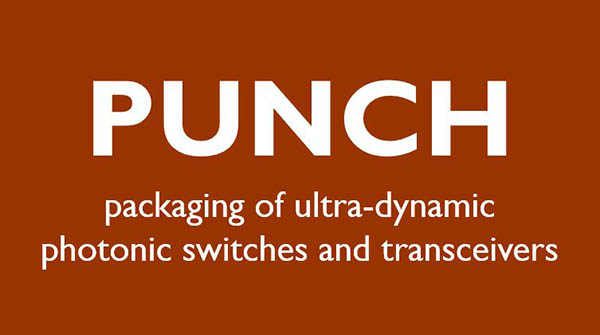
The PUNCH project is setting up an EU-based value chain for a novel system integration platform for optical switching. It provides a roadmap to low cost volume manufacturing of high performance electronic/photonic microsystems that improve network infrastructure and can serve other high value markets like LiDAR and wearables. Partners of PHIX in this project include Imec, NVIDIA and Ericsson.
LOLIPOP is realizing a lithium niobate (LNOI) empowered silicon nitride platform for fragmentation-free operation in the visible and the near-infrared spectrum. This involves the integration with silicon nitride of germanium photodiodes (Ge-PDs), LNOI films, and gallium arsenide (GaAs) actives, through processes like die bonding or micro-transfer printing. The project will develop disruptive new modules for FMCW LiDAR, optical neural networks, and squeezed state sources.
FLEXIT aims to industrialize a novel integration method for indium phosphide (InP) on silicon nitride (SiN) and streamline the supply chain of components for integrated photonics manufacturing. You can read more about the project and its partners in the project brochure (PDF).
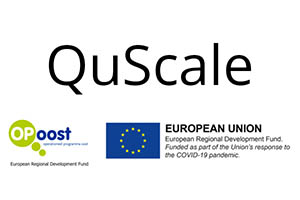
QuScale develops an interposer device that will enable simple and reliable connection of thousands of electrical contacts to a photonic quantum processor chip. In this EFRO Oost project PHIX is collaborating with QuiX Quantum, LioniX International, and Bergh Hybrid Circuits.
PHOTO-SENS is an European Union Horizon 2020 research project that connects pioneering photonic biosensor technology and manufacturing scale-up to aquaculture expertise, with the aim to establish an aquaculture pathogen detection hub and a working prototype system for monitoring salmon pathogens.
TERAWAY is a H2020 5GPPP Phase III project funded by the European Union. This technology intensive project aims to develop a disruptive generation of THz transceivers for high-capacity BH and FH links in 5G networks.
Leveraging optical concepts and photonic integration techniques, TERAWAY will make available a set of groundbreaking transceiver modules. These include 4-channel modules operating from 92 up to 322 GHz, offering up to 241 Gb/s total data rate with transmission reach more than 400 m in the THz band. Four independently steered wireless beams will be used to establish BH and FH connections between fixed terrestrial and moving network nodes.
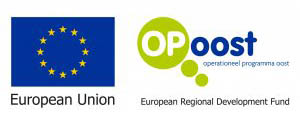
The SensorChip project develops new sensors for accurately measuring liquid and gas flows, gas composition, and the presence of biomarkers in bodily fluids. The sensors are based on silicon nitride photonic integrated circuits that interact with microfluidics. The project is co-funded by the European Union in response to the Covid-19 pandemic.
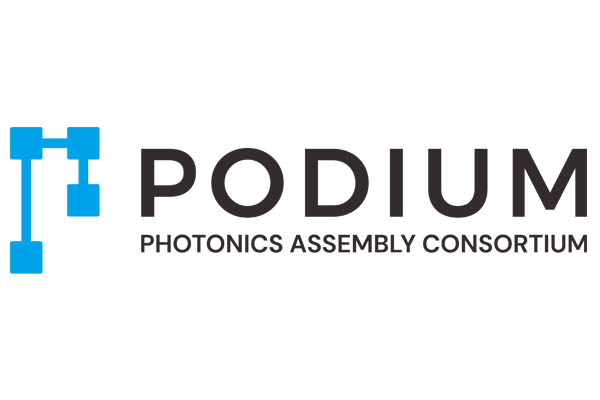
The name PODIUM refers to PIC Open Development Infrastructure for Universal Markets. This Dutch consortium was launched by CITC, PI, Tegema and PHIX and runs a program in which optical termination technology, assembly and packaging is developed for a wide range of integrated photonic applications. Funding is provided by CITC and PhotonDelta.
POETICS is a Research and Innovation project funded by the European Union, which aims to develop novel Terabit optical engines and optical switching circuits. Co-packaged with digital switching chips, these Multi-Chip Modules (MCMs) are set to become the next generation of switching equipment. Their Tb/s capacities and very high energy efficiency will allow the datacenter networks to scale and the 5G wired infrastructures to grow.
The PhotonDelta Flagship project “PICs in Space” connects the main Dutch industry players in the photonic integrated circuit supply chain to design PIC-based modules for space applications. Together, we set out to prove the robustness and reliability of integrated photonics for these demanding applications and demonstrate that the resulting modules can be scaled up to high manufacturing volumes.
